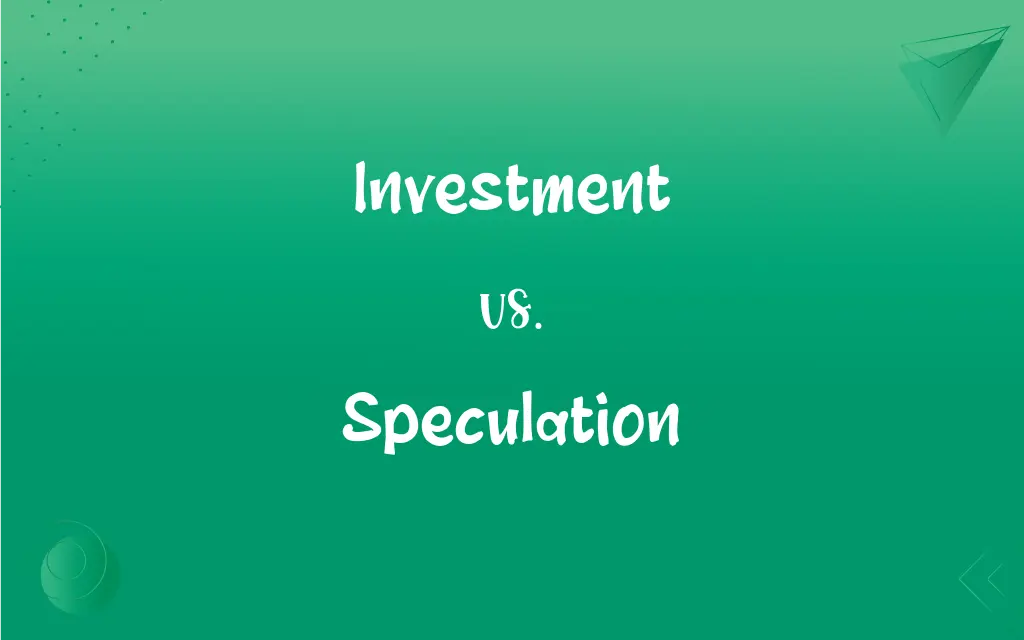Investment vs. Speculation: What's the Difference?
Edited by Janet White || By Harlon Moss || Published on November 29, 2023
Investment involves allocating resources for long-term gains, while speculation is about short-term profits through higher-risk financial transactions.

Key Differences
Investment is the process of putting money into assets or ventures expecting a return over a longer period, emphasizing stability and gradual growth. Speculation, however, is a financial strategy focused on short-term gains, often involving high risk and volatility.
Investors typically research and invest in assets with a proven track record, seeking to build wealth sustainably. Speculators, in contrast, often engage in riskier financial moves, such as trading stocks or commodities based on market predictions and volatility.
Investment strategies generally involve diversification to minimize risk and rely on fundamental analysis of assets. Speculation is more reliant on market timing and trends, often using technical analysis to predict short-term market movements.
Investments are characterized by patience and a long-term view, often contributing to personal financial goals like retirement or education savings. Speculation is more akin to betting on market fluctuations, requiring constant market monitoring and a readiness to act quickly.
While investments typically offer moderate but steady returns, speculation can lead to significant gains or losses in a short period, reflecting its high-risk nature.
ADVERTISEMENT
Comparison Chart
Time Horizon
Long-term gains, stability.
Short-term gains, high turnover.
Risk Level
Lower risk, emphasizing sustainability.
Higher risk, potential for quick gains/losses.
Strategy
Diversification, fundamental analysis.
Market timing, technical analysis.
Goal
Gradual wealth building, achieving financial goals.
Profiting from market fluctuations.
Return Expectations
Moderate, steady returns.
Potential for significant gains or losses.
ADVERTISEMENT
Investment and Speculation Definitions
Investment
Committing resources to achieve gradual financial growth.
Their investment in bonds provided steady, albeit modest, returns.
Speculation
A strategy based on market trends and timing for rapid gains.
Her speculation in tech stocks was based on recent market trends.
Investment
Allocating money into assets for future income or appreciation.
Investing in a retirement fund for long-term financial security.
Speculation
High-stakes financial betting on asset prices.
Speculation led him to invest heavily in commodities based on market predictions.
Investment
Putting capital into ventures or assets expecting a return.
Her investment in real estate aimed to generate rental income.
Speculation
Buying assets with the expectation of short-term price movements.
Speculating on currency fluctuations in the forex market.
Investment
Building wealth through stable and sustainable means.
His stock market investments focused on companies with strong fundamentals.
Speculation
Short-term investment approach with high volatility.
Her speculation in cryptocurrency involved managing rapid price changes.
Investment
A long-term approach to increasing financial assets.
Diversifying her investment portfolio reduced risk and improved potential returns.
Speculation
Engaging in high-risk financial transactions for quick profits.
He engaged in speculation by day trading volatile stocks.
Investment
The act of investing.
Speculation
Reasoning based on inconclusive evidence; conjecture or supposition.
Investment
An amount invested.
Speculation
A conclusion, opinion, or theory reached by conjecture.
Investment
Property or another possession acquired for future financial return or benefit.
Speculation
(Archaic) Contemplation or consideration of a subject; meditation.
FAQs
Do investments typically have a short time horizon?
No, investments usually have a longer time horizon.
Is investment safer than speculation?
Generally, yes, as investment focuses on long-term stability.
Can speculation lead to large returns?
Yes, but it also carries a high risk of significant losses.
What is investment?
Allocating resources into assets or ventures for long-term growth.
What is speculation?
Engaging in financial transactions for quick, often high-risk, profits.
Are stocks considered investments or speculation?
They can be both, depending on the strategy and time horizon.
What’s a common tool for speculators?
Technical analysis to predict short-term market movements.
Is speculation only about financial assets?
Mostly, though it can involve other assets like commodities.
Are all short-term trades speculative?
Not necessarily, but many short-term strategies are speculative.
What is a primary goal of investment?
To build wealth sustainably over a longer period.
Is speculation similar to gambling?
It can be, due to its high-risk and short-term focus.
How do investors manage risk?
Through diversification and fundamental analysis.
Can investment help in retirement planning?
Yes, it’s a key component of long-term retirement planning.
Can investment include assets like real estate?
Yes, real estate is a common long-term investment.
Is market timing more crucial in speculation?
Yes, timing is key in speculation for capitalizing on market changes.
Should beginners engage in speculation?
It’s generally not advised due to its high-risk nature.
Can speculation affect financial markets?
Yes, speculation can significantly impact market volatility.
What’s an example of a speculative asset?
Cryptocurrencies are often considered speculative.
Do investment returns fluctuate widely?
Investment returns are typically more stable than speculative returns.
Does speculation require constant market monitoring?
Yes, staying informed on market trends is crucial in speculation.
About Author
Written by
Harlon MossHarlon is a seasoned quality moderator and accomplished content writer for Difference Wiki. An alumnus of the prestigious University of California, he earned his degree in Computer Science. Leveraging his academic background, Harlon brings a meticulous and informed perspective to his work, ensuring content accuracy and excellence.
Edited by
Janet WhiteJanet White has been an esteemed writer and blogger for Difference Wiki. Holding a Master's degree in Science and Medical Journalism from the prestigious Boston University, she has consistently demonstrated her expertise and passion for her field. When she's not immersed in her work, Janet relishes her time exercising, delving into a good book, and cherishing moments with friends and family.






































































